NIL
Diego Pavia opens up on NIL negotiation at Vanderbilt, whether he considered leaving


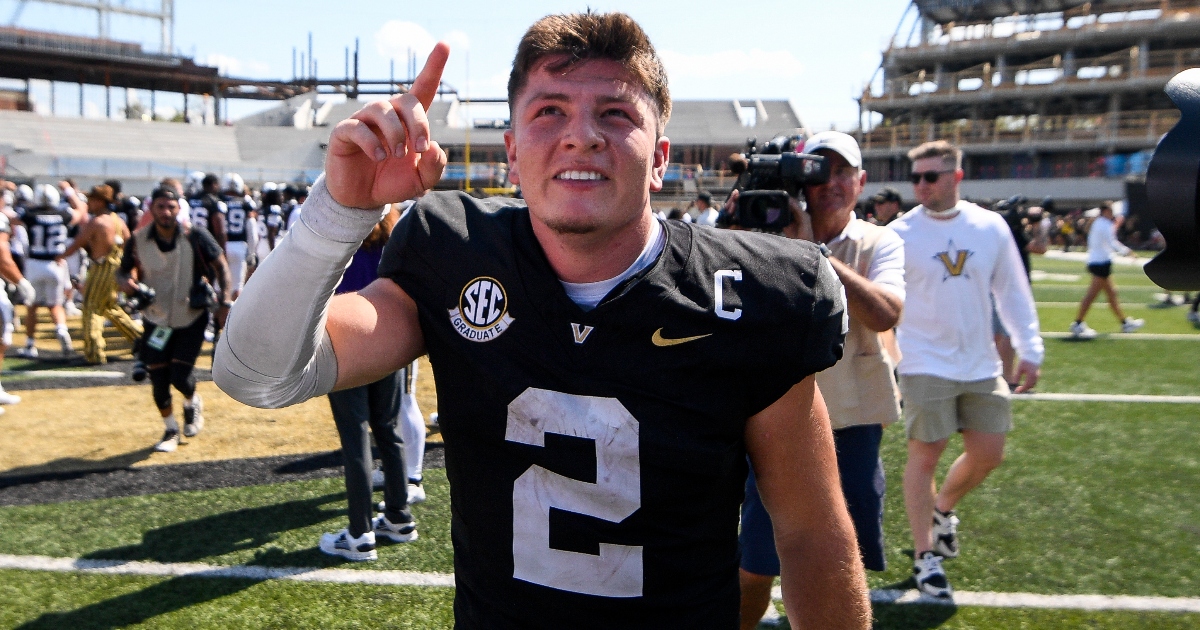
In late December, Vanderbilt quarterback Diego Pavia secured a preliminary injunction which granted him an extra year of eligibility. He then quickly announced he’d be back with the Commodores, providing a big boost for Clark Lea and Co.
Pavia “never flirted” with leaving Vanderbilt after one year, he told Will Compton and Taylor Lewan on Bussin’ with the Boys. He confirmed he received plenty of interest – including an NIL deal worth more than $4 million from an unnamed SEC program – but opted to stay.
Pavia still went through negotiations at Vanderbilt and although he didn’t necessarily get the $4 million he could have gotten via the transfer portal, he still expressed confidence in the Commodores’ roster. That’s why he said it came down to winning.
“The number’s great,” Pavia said of his negotiations at VU. “The numbers are great. But winning is more important to me than anything. And we’ve got the squad to go do it.”
Diego Pavia: ‘It’s all a money game’
As he sought a preliminary injunction to get one more year of eligibility at Vanderbilt, Diego Pavia argued he had upward of $1 million at stake. His $1.6 million On3 NIL Valuation – fueled by a $1.4 million roster value – ranks No. 28 in the college football NIL rankings.
Pavia addressed the balancing act necessary in negotiations for a new deal. He pointed out conversations with Jerry Kill and offensive coordinator Tim Beck about why it’s important for him to return, but acknowledging $4 million could stretch the budget thin. But with a plan in place to build the roster, Pavia went all-in on Vanderbilt.
“It was difficult, for sure, because you’ve got Coach Kill and Coach Beck relying on you to come back. But it’s all a money game,” Pavia said. “You’ve got other schools offering you $4 million and they don’t want to pay you $4 million. But like, you took a chance on me, so I understand that. … They told me the things that I wanted to hear, of how they’re going to build the offense, know what receivers we’re going to go get.
“And they were telling me, we can pay you that, but we are not going to have enough money to go get these guys to go throw the ball around. And it just made sense to me, like, man, I value winning over anything else. It was perfect.”
Vanderbilt brought in 20 players from the transfer portal this cycle, including three wide receivers. Those additions are already making an impression – and Pavia is ready to roll.
“It’s like playing with a new toy every day,” Pavia said. “You just throw the ball as far as you can. You’ve got some fast little Black kid just f—ing catch it.”
NIL
2026 Heisman Trophy: CBS Sports names front-runners for the college football’s top award

The 2025 Heisman Trophy race is in the books, and now the college football world can turn its attention to the 2026 Heisman Trophy race. There, it should be a highly competitive race with several players set to return who look like candidates for college football’s top award.
Ahead of the 2026 season, CBS Sports took a look at those candidates. That included sorting them into two categories. That’s the top Heisman contenders for the 2026 season and other names to know for the race. Of course, there’s plenty of room for surprises beyond that too.
Several players who CBS Sports lists could be on the move next season. That includes in the Transfer Portal or going into the NFL Draft. So, with the offseason just around the corner, there’s time for things to change.
Top Heisman contenders in 2026
Arch Manning, QB, Texas Longhorns
Texas Longhorns quarterback Arch Manning got his first action as a starter in 2025. That moment had been highly anticipated since he was in high school and it came with mixed results. Still, with another year of experience, he very well could contend for the Heisman Trophy.
Of course, Manning does have the option to enter the NFL Draft. That’s not what most people anticipate, though, as returning to Texas for another season should help him improve that stock. Certainly, being a Heisman winner wouldn’t hurt either.
Julian Sayin, QB, Ohio State Buckeyes
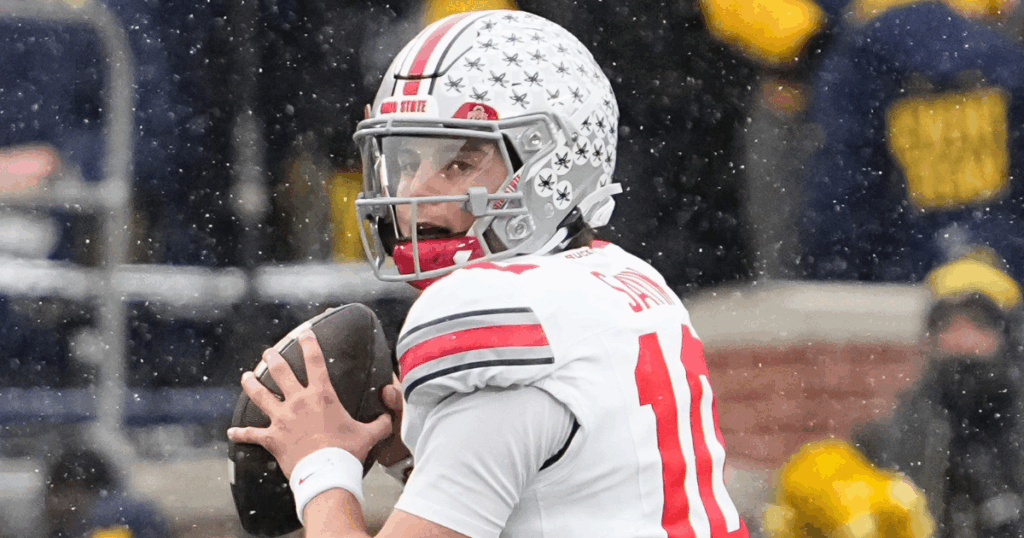
It was a disappointment in New York for Ohio State quarterback Julian Sayin. A Heisman finalist this season, he didn’t end up going home with the hardware. Instead, he’ll have to refocus on the College Football Playoff and winning on the field.
As a redshirt freshman, Sayin was a Heisman finalist. He’ll be back again in 2026 with added experience that is almost impossible to find in college football. So, there’s no reason why he can’t win.
Jeremiah Smith, WR, Ohio State Buckeyes
Coming into the 2025 season, Jeremiah Smith was commonly thought of as the best receiver in all of college football. He wouldn’t end up winning the Biletnikoff Award or being a Heisman finalist, though he was still thought of as the most talented receiver in the country.
Just a sophomore, Smith will be back next season and will, once again, be among the most thrilling players in the game. The only concern is whether or not he and Sayin will steal Heisman votes from one another.
Marcel Reed, QB, Texas A&M Aggies
Marcel Reed has been a revelation at quarterback for Texas A&M. The Aggies’ signal caller led Texas A&M to the College Football Playoff and has made them a legitimate threat to win the national championship. He’d use both his arm and legs to get there too.
As one of the most exciting players in the game who plays on a massive stage in the SEC, Reed is going to have the spotlight on him in 2026. If he plays up to his capability, he’ll be in the Heisman conversation once again. There’s no reason to think he can’t win it too.
Jayden Maiava, QB, USC Trojans
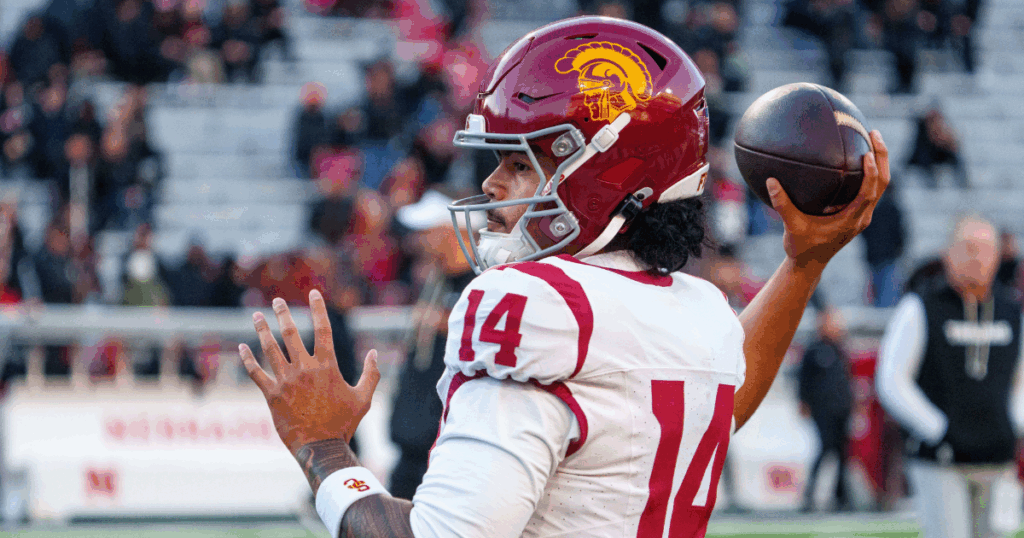
After taking over as the USC starter late in 2024, Jayden Maiava would hit his stride in 2025. Now, he and head coach Lincoln Riley are looking for a way to build on that once again.
If there is one thing that Lincoln Riley has found success doing it’s developing quarterbacks and explosive offenses. That’s led to Heisman Trophy success, including at USC. So, it’s not unfair to have high expectations for next season.
Other names to know
Ty Simpson, QB Alabama Crimson Tide
Alabama quarterback Ty Simpson is eligible to turn his attention to the NFL Draft next season. If he chooses to return to college, though, Simpson is going to be viewed as one of the best quarterbacks in the entire sport. He could very well even be a Heisman contender.
Gunner Stockton, QB, Georgia Bulldogs
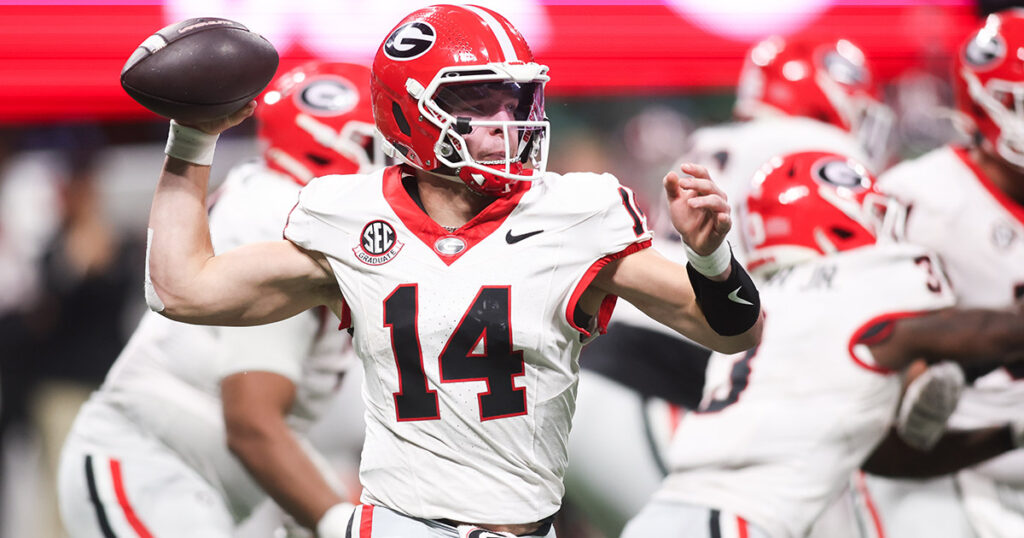
Georgia managed to win the SEC and a first round bye in the first season Gunner Stockton led the Bulldogs as their starting quarterback. He’ll likely be back next season with much higher expectations from the jump. So, he could feasibly end up in the Heisman race more so than he was in 2025.
Drew Mestemaker, QB, North Texas Mean Green
There is a chance that Drew Mestemaker could be a transfer this offseason, as his head coach is on his way to Oklahoma State. That comes after the pair combined for a phenomenal season at the Group of Five level. With more attention on him from the start, regardless of where he’s playing, the Heisman isn’t out of the question.
Sam Leavitt, QB, Arizona State Sun Devils
For the past two seasons, Sam Leavitt has been vital to making Arizona State one of the best teams in the Big 12. Now, there are rumblings that he could transfer. Regardless of where he ends up, Leavitt should be a Heisman contender.
Ahmad Hardy, RB, Missouri Tigers
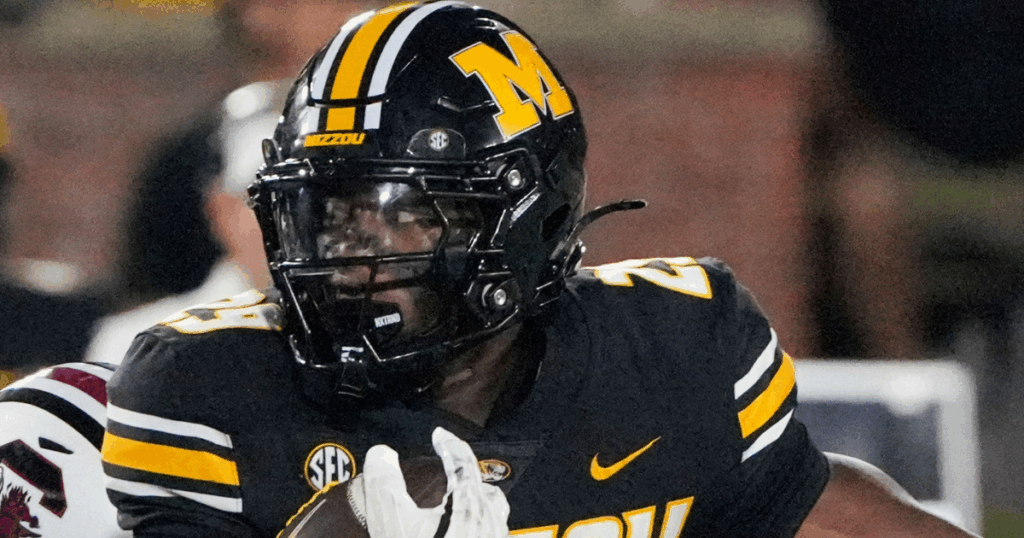
The Missouri Tigers managed to find one of the best running backs in the entire country this season, bringing in Ahmad Hardy. He’d rush for 1,560 yards and 16 touchdowns in 2025. If he can build on that in 2026, the Heisman may not be able to ignore his success.
Kewan Lacy, RB, Ole Miss Rebels
Another running back to keep an eye out on for the Heisman race next season is Kewan Lacy. The Ole Miss running back had 20 rushing touchdowns this year. That’s hard to ignore, but it’s also hard to replicate.
NIL
Dan Lanning Reveals Reasoning Behind His Loyalty to Oregon
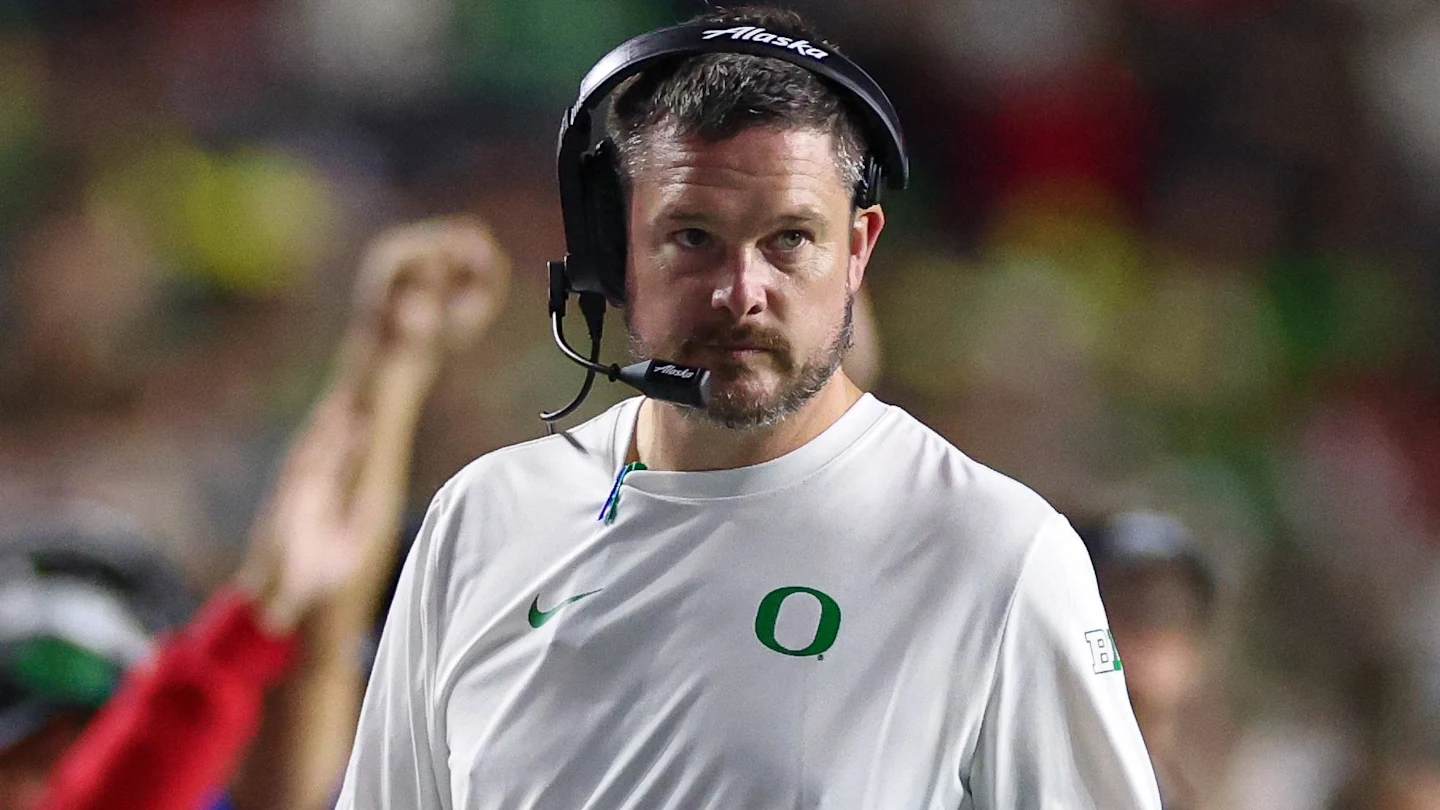
Dan Lanning has been asked many times since 2022 if he’d leave the Oregon Ducks for another head coaching job. While rumors have swirled pertaining to college football openings, a position in the NFL is something that could’ve lured Lanning away from Eugene in the past.
But the Ducks’ coach revealed on The Inner Circle Podcast that his former aspiration of coaching at the professional level is old news.
Dan Lanning Remains Committed to Oregon

Lanning spoke about how he started writing his career goals on his mirror when he was at Arizona State.
“I still put my goals on my mirror,” he said. “No. 1 best father on staff, best husband on staff, man of integrity, Christian, five recruits.”
Lanning, who was a graduate assistant for the Sun Devils, wanted to become a full-time employee. He checked that off the list by getting hired as the on campus recruiting coordinator.

“My next goal on there was head coach, 35. I thought that was really important to me,” Lanning said. “Well, I became the head coach at Oregon at 35. Next goal on there is NFL coach. That ain’t on my goal board no more. It’s off my board. It’ll never be up there again like that.”
Oregon hired Lanning as its football head coach on December 11, 2021, after he won as National Championship as the Georgia Bulldogs defensive coordinator. He’s quickly made a name for himself as one of the top young college football coaches.

Despite Lanning’s name getting thrown around as a candidate for vacancies like Alabama in 2024 or LSU in 2025, he’s remained vocal that Eugene is where he wants to be.
“I truly believe this will be my last job,” Lanning said. “The secret to that is I gotta win. Now do I coach as long as Nick Saban did? I don’t know about that.”
MORE: Weather Concerns Begin For Oregon’s Playoff Game vs. James Madison
MORE: Three Reasons Why Oregon Could Be The Most Dangerous Playoff Team
MORE: Oregon Ducks Projected to Make Program History In 2026 NFL Draft
SIGN UP FOR OUR NEWSLETTER HERE!
Dan Lanning Opens Up About Finishing His Career at Oregon
Staying with the Ducks seems to have additional meaning for Lanning beyond just his loyalty to the program. He said his family plays a major role in why he wouldn’t take an NFL job.
“It used to be a dream, but dreams can change,” Lanning said. “When we took this job, two of my kids had lived in eight states. And you realize, dang, like is that fair to them?”
“So, we took this job, I made a promise to my kids that you’re going to graduate from the same high school. You’re going to graduate from the same middle school,” he continued. “Like, those things are way more important to me than getting the opportunity to coach in the NFL.”

Lanning coached at six different schools from 2011 to 2021 before taking the job at Oregon. He’s coached the Ducks to a second consecutive College Football Playoff this season.
No Oregon head coach has spent more than five full seasons with the program since Mike Bellotti coached from 1995 to 2008. Lanning can change that in 2026.
NIL
Adidas releases tribute to Indiana QB Fernando Mendoza after winning Heisman Trophy

As Fernando Mendoza put the finishing touches on a Heisman Trophy-winning season, he signed an NIL deal with adidas. Shortly after he won college football’s highest honor, the brand paid tribute.
Adidas released a video honoring Mendoza after he won the Heisman on Saturday night. The brand paid homage to his viral quote following the Big Ten Championship when the IU quarterback told FOX Sports’ Jenny Taft, “The Hoosiers are flippin’ champs.”
SUBSCRIBE to the On3 NIL and Sports Business Newsletter
Throughout the year, Mendoza not only became one of the biggest stars on the field, but one of the top names in the sport. He has a $2.6 million On3 NIL Valuation as Indiana soon prepares for the College Football Playoff as the No. 1 seed.
Just before IU took on Ohio State in Indianapolis, Mendoza announced his high-profile NIL deal with adidas. He is the latest college football star to partner with the Three Stripes, joining Ohio State receiver Jeremiah Smith and Nebraska quarterback Dylan Raiola, among others.
“Excited to share that I’ve accepted an opportunity to join adidas!” Mendoza wrote in a LinkedIn post. “I’m very grateful for everyone who has supported me along the way and excited to bring my passion for sport, leadership, and work ethic to the Three Stripes. Let’s get to work.”
More on Fernando Mendoza’s Heisman season
Mendoza led the nation with 33 touchdown passes this year while completing 71.5% of his passes for 2,980 yards, to just six interceptions. Additionally, his $2.6 million On3 NIL Valuation ranks No. 5 in college football and No. 7 in the On3 NIL 100, the first of its kind and defacto NIL ranking of the top 100 high school and college athletes ranked by their On3 NIL Valuation.
Fernando Mendoza beat out Vanderbilt quarterback Diego Pavia for the award, garnering 643 first-place votes and 2,362 points. Pavia got 189 first-place votes and 1,435 points. It’s the latest chapter in a special season for the former Cal star, who helped lead Indiana to its first outright Big Ten title since 1945.
After the announcement, Mendoza delivered a passionate speech. As he wrapped, he had a message for young athletes who think they’re not getting enough attention or are ranked high enough.
“The truth is, you don’t need the most stars, hype or rankings,” Mendoza said. “You just need discipline, heart and people who believe in you. And you need to believe in your own abilities. I hope this moment shows you that chasing your dreams are worth it, no matter how big or impossible they seem.”
NIL
Charles Barkley on NIL, transfer portal: ‘You should not have the ability to get a better offer every year’

NBA legend Charles Barkley has not been shy about his thoughts on NIL and the transfer portal. During Saturday’s Kentucky vs. Indiana broadcast, he candidly discussed the landscape again.
Barkley called the game on ESPN alongside Dick Vitale, the first of two games they will work together. Vitale called for “stability” in college basketball – and college sports as a whole – because of the amount of player movement via the portal. He used Indiana as an example since new coach Darian DeVries virtually built the program from scratch.
Advertisement
SUBSCRIBE to the On3 NIL and Sports Business Newsletter
While Barkley acknowledged he’s in favor of athletes making money through NIL, he also called out players staying more than their four years of eligibility. In addition, he disagreed with the idea of athletes being allowed to seek better offers after every season.
“No. 1, I’m not opposed to players getting paid,” Barkley said on the broadcast. “I always want my players to get treated fairly. But I can’t remember the last time I heard the word, COVID. Some of these guys have been in college for six or seven years. If you’re in college for six or seven years, your name better be, ‘Dr. Somebody.’ You should not still be playing college basketball after six or seven years.
“But you should not have the ability to get a better offer every year. That’s not fair to any school that you are affiliated with because I can’t even do that. None of us can do that, take a better – Amazon, anybody or FOX Sports can come and say, ‘Well, we’ll give you more money and you can leave after every year.’ That’s not fair. … We’ve got to put some guardrails on these sports.”
Advertisement
One of the other new parts of the college basketball landscape is G-League players seeking eligibility. The NCAA has changed its approach regarding players who played in the G-League, arguing they were not professional athletes in a way the old rule said. Instead, if those players are within five years of their high school graduation, they could become eligible unless they went through the NBA Draft process or signed an NBA contract.
To Charles Barkley, that’s another area that needs fixing. He does not think former G-League players should be able to play college basketball.
“We’ve got guys playing in the G-League coming back to college sports now,” he said. “I don’t think that’s fair.”
NIL
Charles Barkley sends strong message after historic college football program’s CFP snub

Hall of Famer and ESPN basketball analyst Charles Barkley has an opinion on most everything, and that includes the College Football Playoff committee’s decision to leave 10-2 Notre Dame off of the 12-team bracket.
Barkley and ESPN college basketball analyst Dick Vitale discussed the Fighting Irish’s CFP snub while calling the Indiana-Kentucky game on Saturday night.
“I was disappointed, but you could see it coming in the last couple polls,” Barkley said. “They were creeping up on Miami. And my biggest problem with the whole thing, everybody’s talked about head-to-head. First of all, that was in August.
“They were very close games [against] A&M and at Miami, but your team is not the same in August as it is in December. Notre Dame is playing as well as anybody in the country other than Indiana and probably Ohio State. And I don’t want to leave out the [Georgia] Bulldogs. Kirby Smart, that man can really coach.”

Notre Dame’s exclusion from the bracket after winning its final 10 games all by double-digit margins and being ranked ahead of Miami (10-2) in every CFP poll until the final one, even though neither the Irish nor Hurricanes played in that final week before the bracket was set, will go down as one of the biggest playoff controversies.
Ultimately, it came down to Miami’s 27-24 home win over Notre Dame in Week 1, a field goal with 1:04 remaining.
Miami supporters clamored and complained all along that the Hurricanes should have been ranked ahead of the Irish, given the same record, well before the final bracket was set. But the teams’ seasons went very different directions after that Week 1 meeting.
Notre Dame lost its first two games by a combined four points, including a 41-40 Week 2 loss to Texas A&M (another CFP team), before reeling off those 10 straight wins, most in dominant fashion.
Miami lost twice in a three-game span to unranked Louisville and SMU before regrouping and finishing strong.
The first CFP rankings came out after that second loss, with Miami landing at No. 18 and Notre Dame at No. 10. Because the teams weren’t close in their overall ranking, the head-to-head result didn’t factor in at the time, and that remained the CFP committee’s explanation even as the teams moved closer and closer in the rankings.
Ultimately, they were two spots apart at No. 10/12, separated by BYU, entering last weekend, when the Cougars got blown out by Texas Tech, essentially forcing the committee to consider Notre Dame and Miami side by side. Others have suggested that both teams deserved to be in over 10-3 Alabama, which lost 28-7 to Georgia in the SEC championship game.
Notre Dame has not taken the snub well and declined to participate in a bowl game as a result.
No. 10-seed Miami will play at No. 7 Texas A&M in the first round of the playoffs on Dec. 20.
NIL
President Donald Trump calls NIL a ‘disaster’ for college athletics, Olympics

President Trump this weekend noted the “current state of NIL is simply not sustainable and could cause serious damage to college athletics, and even the Olympics.” Trump during an event hosting members of the 1980 Miracle on Ice team said, “I think that it’s a disaster for college sports. I think it’s a disaster for the Olympics.” Trump: “The colleges are cutting a lot of their — they would call them sort of the ‘lesser’ sports, and they’re losing them like at numbers nobody can believe. They were really training grounds, beautiful training grounds, hard-working, wonderful young people.” Trump added, “A lot of these sports that were training so well would win gold medals because of it. Those sports don’t exist, because they’re putting all their money into football.” Trump: “Colleges cannot afford to be paying the kind of salaries that you’re hearing about” (OUTKICK, 12/13). Trump said of overhauling NIL in college sports, “Something ought to be done, and I’m willing to put the federal government behind it. And if it’s not done fast, you’re going to wipe out colleges” (USA TODAY, 12/12).
-

 Rec Sports3 weeks ago
Rec Sports3 weeks agoFargo girl, 13, dies after collapsing during school basketball game – Grand Forks Herald
-

 Motorsports3 weeks ago
Motorsports3 weeks agoCPG Brands Like Allegra Are Betting on F1 for the First Time
-

 Sports3 weeks ago
Sports3 weeks agoTwo Pro Volleyball Leagues Serve Up Plans for Minnesota Teams
-

 Sports3 weeks ago
Sports3 weeks agoUtah State Announces 2025-26 Indoor Track & Field Schedule
-

 Sports3 weeks ago
Sports3 weeks agoSycamores unveil 2026 track and field schedule
-

 Motorsports2 weeks ago
Motorsports2 weeks agoRedemption Means First Pro Stock World Championship for Dallas Glenn
-

 Motorsports2 weeks ago
Motorsports2 weeks agoJo Shimoda Undergoes Back Surgery
-

 Sports3 weeks ago
Sports3 weeks agoTexas volleyball vs Kentucky game score: Live SEC tournament updates
-

 Rec Sports2 weeks ago
Rec Sports2 weeks agoRobert “Bobby” Lewis Hardin, 56
-

 Rec Sports2 weeks ago
Rec Sports2 weeks agoHow this startup (and a KC sports icon) turned young players into card-carrying legends overnight

























